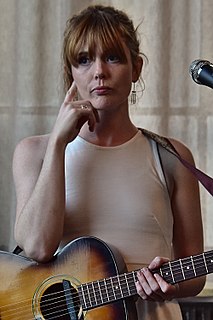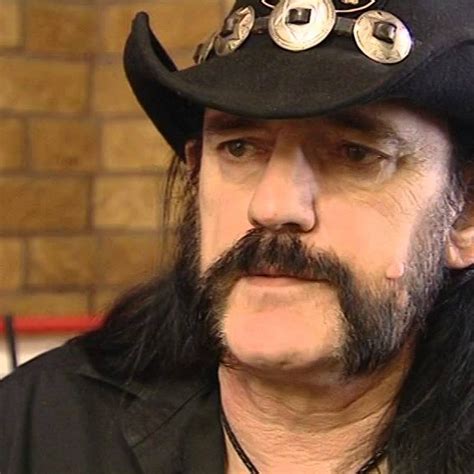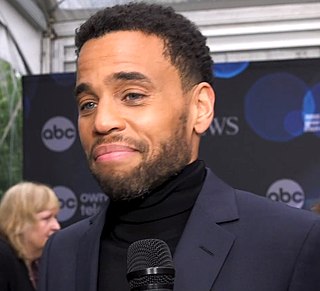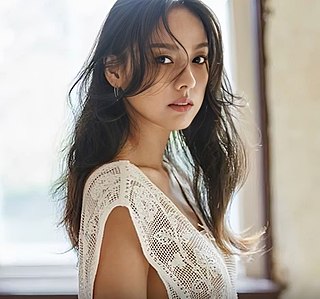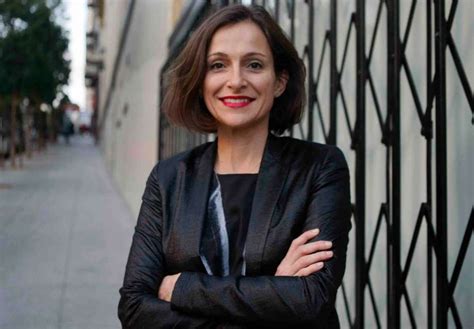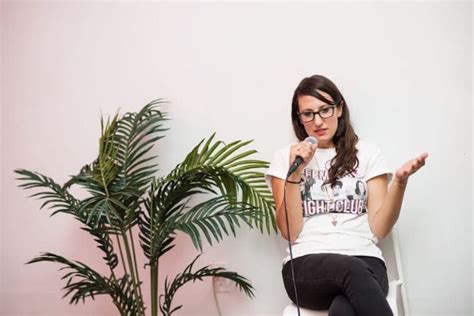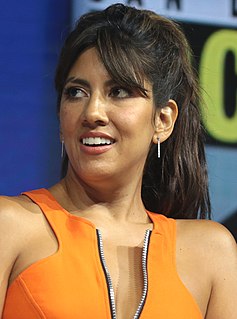Top 514 Stereotypes Quotes & Sayings - Page 9
Explore popular Stereotypes quotes.
Last updated on April 16, 2025.
Suppose you came across a woman lying on the street with an elephant sitting on her chest. You notice she is short of breath. Shortness of breath can be a symptom of heart problems. In her case, the much more likely cause is the elephant on her chest. For a long time, society put obstacles in the way of women who wanted to enter the sciences. That is the elephant. Until the playing field has veen leveled and lingering stereotypes are gone, you can't even ask the question.
I think my philosophy on music is sort of like the difference between religion and spirituality or religion and faith. There's a lot of bullshit in the music industry. It's really tough to get a leg up and navigate around your gender and stereotypes. You feel hopeless, [but] all of that disappears the minute that I start writing a song. Then I record something and have that magical feeling. You have to have the negative and the positive. Trying to own that and go to that place in yourself creatively is the most important thing.
The unique, compelling, and earnest voice that characterizes Jedediah’s weekly columns comes alive with increased vitality in OUTNUMBERED. She shatters leftist stereotypes about conservatives and exposes the myth of liberal tolerance as she relates her interactions with liberals in everyday life. This narrative, interlaced with commentary and impressions, gives us insight into liberals that books merely about abstract principles do not capture. A fascinating read.
In terms of feminism, I would just ask young women to keep an open mind about it and try to learn about it before they write it off or believe the negative stereotypes that surround it. Feminism can help you on a personal level, it can offer you an incredible community of brilliant and impassioned people, and can change the way you see the world if you just open yourself up to it. I think that goes for all causes as well.
I got a call from a mutual friend of ours, Charles King, who's also the executive producer. [Steven Caple Jr and I] had a conversation about it. I read it. We kind of finished each other's sentences when it came to the nuances and personality flaws that the character had, and some stereotypes and things we were trying to stay away from. We agreed on that as well. He just kind of allowed me to run rampant with the ideas. As we paced ourselves through, we developed Turquoise.
Even the new feminist research on sex-role socialization and sex differences has sometimes had the unfortunate consequence of creating a new set of stereotypes about what women feel and how women behave. Despite the large amount of overlap between the sexes in most research, the tendency to label and polarize and thus to exaggerate differences remains in much reporting of data, which may, for example, report the mean scores of male and female populations but not the degree of overlap.
My personal story is that my father was a heroin addict and a heroin dealer and has been in and out of prison my entire life, he's been arrested sixty times. I also have an older brother addicted to crack cocaine who's been in and out of prison so it was really important for me to tell a story that shows the humanity and the journey of a man getting of our prison and trying to re-acclimate into society. It's apart of our community that we have stereotypes and ideas about but we don't actually know much about it, unless we know someone personally.
Our goal is to have a country that's not divided by race. And my impression, as I travel around the country, is that that's the kind of country that most people want, as well, and that we all have prejudice, we all have certain suspicions or stereotypes about people who are different from us, whether it's religious or racial or ethnic, but what I think I found in the American people, I think there's a core decency there, where if they take the time, if they get the time to know individuals, then they want to judge those individuals by their character.
In a manner akin to the influence of Tiger Woods on the other side of the Atlantic, Thierry Henry has helped kick down a few of the remaining bigoted stereotypes. Through his undisputable class and dignity, Henry has made a deep-seated difference to race relations in this country. Racism will flounder whenever white children grow up with a black man as their hero. That so few comment on Henry's colour is a silent tribute to his impact.
That's another great thing about Think Like a Man picture. The cast is predominantly African-American, but color is never really an issue in the film. It's rarely brought up since, at the end of the day, these guys are going through universal relationship issues that anybody can relate to. So, while the characters like "The non-committer," "The Player," and "The Dreamer" might be recognizable as common stereotypes, color isn't involved.
Today there are a huge number of think tanks working on poverty-related issues; there are books written on the topic; and university centers being created to study poverty. But, at the same time, the media has a terribly hard time with this issue; it's very hard to convince editors and publishers to devote resources to complex investigations of the lives of America's poor. And, as a result, too often poverty is portrayed in stereotypes, in sound bites, in a few pat images rather than in its full Technicolor complexity and diversity.
I want to tell everyone, 'You're perfectly fine right now.' No one told me that.. I hope people can think, 'I'm great the way I am. I'm doing fine. Even if I can't reach the criteria of success measured and necessitated by society, even if I'm weeded out, I'm beautiful the way I am. I'm pretty, I'm perfectly fine without having to think about other people's opinions and stereotypes.'
If you have the personalities down, you understand them and identify with them; you can stick them in any situation and have a pretty good idea of how they're going to respond. Then it's just a matter of sanding and polishing up the jokes. But if you've got more ambiguous characters or stock stereotypes, the plastic comes through and they don't work as well. These two characters clicked for me almost immediately and I feel very comfortable working with them.
Despite its self-regard, and much like a society of devout followers, the art world relies on consensus as heavily as it depends on individual analysis or critical thinking. Althought the art world reveres the unconventional, it is rife with conformity. Artists make works that "looks like art" and behave in ways that enhance stereotypes. (...) Originality is not always rewarded, but some people take real risks and innovate, which gives a raison d'être to the rest
When the students were asked to identify their race on a pretest questionnaire, that simple act was sufficient to prime them with all the negative stereotypes associated with African Americans and academic achievement. If a white student from a prestigious private high school gets a higher SAT score than a black student from an inner-city school, is it because she’s truly a better student, or is it because to be white and to attend a prestigious high school is to be constantly primed with the idea of “smart”?
I'm a pragmatist. I think, as a woman, you have to be more careful. You have to be more communal, you have to say yes to more things than men, you have to worry about things that men don't have to worry about. But once we get enough women into leadership, we can break stereotypes down. If you lead, you get to decide.
My being Indian is possibly the biggest thing that influences my stories. Not just in terms of settings - most of the settings in my stories are Indian - but also in terms of characters and plot. I think growing up in India grew my imagination in certain ways that would not have happened in any other place. I'm also fascinated by the idea of India, and writing stories allows me to explore this. As for thematic elements, they are probably pretty obvious in my stories. I also hope that my stories bust stereotypes at least to a modest extent.
The reliance on stereotypes is in part the result of a structural problem within the media. Most newspapers have a business beat, with a number of highly trained journalists who know how to cover companies, trading, the markets and so on. But almost none have labor reporters anymore, and to my knowledge, none have full-time poverty-beat correspondents. And all of this helps to render invisible the lives and the life stories of tens of millions of Americans.
This and the small sample size inevitably leads to stereotypes - sweeping family sagas from India, 'lush' colonial romances from South-East Asia. Mother and daughter reconciling generational differences through preparing a 'traditional' meal together. Geishas. And even if something more exciting does manage to sneak through, it gets the same insultingly clichéd cover slapped on it anyway, so no one will ever know.
I decided when I was 19 that I didn't like all these stereotypes that I was supposed to fit into. I wasn't comfortable and they made me very unhappy. So I tried and I spent a miserable summer, and then I went back to school and said, 'I'm going to do my own thing because I think I have a thing to do. I'm not going to live in anybody else's image because I don't like that.' I felt much better. I didn't do it to rebel against anybody or anything.
I never went in thinking, "You're an African-American woman, so you're never going to win." I was just in career doing beauty pageants for the experience, and to show my brains and talent and help break stereotypes. It wasn't like, "Oh, I'll become a star. I'm beautiful." I never thought I was pretty. I couldn't even put on eyelashes or makeup. When you come from an environment that's military, and they don't stress that topic of aesthetics or beauty pageants and makeup, there are a lot of things you just don't have that city girls have.
Basically, there are two kinds of stereotypes out there in the world about America. There's America the Goliath - the big, powerful, bullying country that pushes its way around the world and gets its ways, pursues its own interests nakedly, irrespective of what others want. And the other stereotype is America, the land of opportunity, where everyone can go and do anything, be anything, make any dreams come true.
When women negotiate they are often viewed as pushy, but if you think about the way women are viewed at large: we are nurturing, helpful, motherly. Those are all stereotypes, of course, but if you play into them you don't face the same penalties. I struggle with this because I hate the fact that because I am a woman, I am supposed to smile when I go into a negotiation. But it's been shown to work. I shouldn't have to smile, but if doing so means that I am going to get the money and rise in power, then I see it as a necessary evil. Once we're in power, we can have resting b*tch face all day.
You are American, whether you profess Judaism, Catholicism, Protestantism, whether you adhere to Islam, or whether you believe in nothing at all. And you're as American as anybody else, whatever your religious beliefs. But try not to get caught up in media stereotypes of your neighbors and of your country. Think about people that you know and how they treat you. As you get to know someone, it matters not what religious background they have, or what their nationality is, or where they came from. And I think that's how Americans really do relate to each other on a personal level.
Until we start attacking the root of the historical problems of discrimination against Indians, and those Indians begin in these stereotypes, that Indians are less civilized than us, they're less able to exercise self-governing functions. Until we get to the roots of those problems, we're not going to change legislation. We're not going to change the hearts and minds of the Supreme Court.
There was no real strategic decision about editorial tone. It was kind of a write whatever you want to write, and we'll see how it goes. I think that we lucked out in that all of the women who started writing at Feministing.com were really funny, and I don't think that's something people are used to seeing or hearing when they read feminism. You know, you think feminism and you kind of think academic, women's studies, dry, humorless; there are all of these stereotypes that go along with what feminist thought is and what feminist writing is.
I feel a lot of personal responsibility to undo the negative stereotypes. I know that it's not coming from a bad place. It's coming from an ignorant place. I can sort of be an ambassador in a subtle way to say, "This is what I am: a comedian, a show host, a writer." It will still always be part of the conversation and people will want to focus on it because there is a culture that is so embedded that if you have a disability, you're someone to be either admired just for living, or be pitied for having to struggle.
I can no more disown (Jeremiah Wright) than I can disown the black community. I can no more disown him than I can my white grandmother - a woman who helped raise me, a woman who sacrificed again and again for me, a woman who loves me as much as she loves anything in this world, but a woman who once confessed her fear of black men who passed by her on the street, and who on more than one occasion has uttered racial or ethnic stereotypes that made me cringe.
The original feminists wanted two things. They wanted the right to vote, from which we could work to get more equality. And we have made progress. We did pass the anti-discrimination law, Title 7, Title 9, equality in the workplace, equality in education and in sports and in all these other areas. But enforcement is very hard. Changing stereotypes is very hard.
I'm from a Lebanese-American family. And I've been had lot of contacts and - with Arab-American community, especially Arab-American filmmakers and actors and so forth. It's a community that, a minority that really hasn't been heard from enough. And so many of the stories that are told about Arab-Americans these days are just negative portrayals in the news, but also in television and film. So we're - we set out to try and offset some of those stereotypes.
The systems of stereotypes may be the core of our personal tradition, the defenses of our position in society. They are an ordered more or less consistent picture of the world, to which our habits, our tastes, our capacities, our comforts and our hopes have adjusted themselves. They may not be a complete picture of the world, but they are a picture of a possible world to which we are adapted. In that world, people and things have their well-known places, and do certain expected things. We feel at home there. We fit in. We are members.
When you label somebody and put them in a box, then you put the lid on the box, and you just never look inside again. I think it's much more interesting for human beings to look at each other's stories and see each other. Really see each other and then see themselves through other people's stories. That's where you start to break down stereotypes.
If I see a black kid in a hoodie and it's late at night, I'm walking to the other side of the street. And if on that side of the street, there's a guy that has tattoos all over his face, white guy, bald head, tattoos everywhere, I'm walking back to the other side of the street, and the list goes on of stereotypes that we all live up to and are fearful of.
I didn't have a perfect model, but I wanted to try to blend my own personal reflections and experiences with this broader canvas to see how a lot of the narratives we have about economy and foreign policy got stuck. Because we have these categories of liberal, conservative, free marketer, open government - all these stereotypes about our politics and the categories we try to put things in are inadequate to this sort of complex, ambiguous, sometimes contradictory experience we have as ordinary people and that I have as an elected official.

